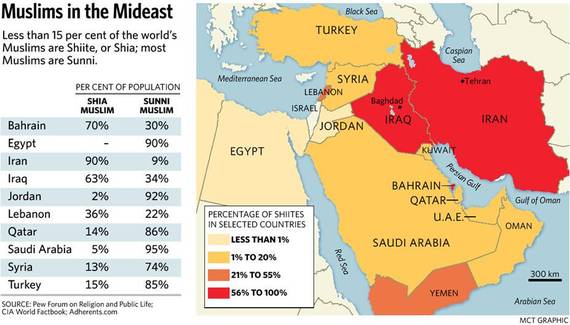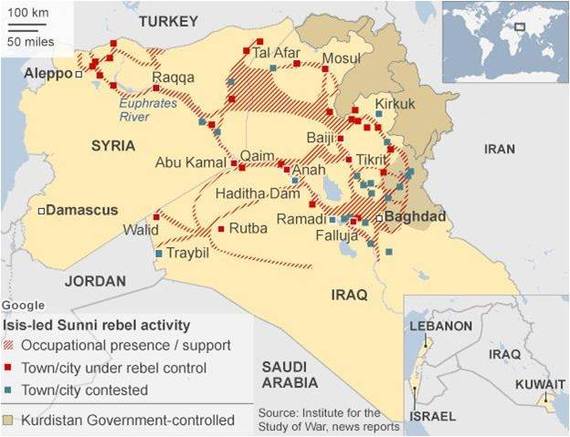It's the beginning of the week and I just carefully listened to the New York Times op-ed columnist Thomas Friedman interview with President Barack Obama in the Map room of the White House on August 8, 2014. President Obama talked about different international issues, ranging from Iraq to Israel, from Ukraine to the pivot to Asia, from the Arab Springs to Latin America, on economic and trade topics touching nuclear and energy resources. All in 60 minutes talk, he discussed the American foreign policy, the world order (and disorders), and the need for international rules.
Disorders are especially happening in Iraq right now, where ISIS militants are advancing towards Erbil, the Kurdish capital, and some 200,000 people have fled to other parts of Northern Iraq. Last Thursday, August 7, President Barack Obama authorized to conduct targeted strikes on Islamic State fighters in Northern Iraq, a long-term operation designed to prevent what he called a potential "genocide" of a religious sect, and also to protect American officials working in the country. American planes are dropping food and water for about 8,000 people in the area. The targets of ISIS militants are members of religious minority groups allied with the Kurds, the Yazidis.
To better navigate into the Middle East in flames, let me share some religious definitions, words and expressions we will be hearing and reading a lot in the following weeks.
Sunni
Sunni Islam is the largest branch of Islam. Adherents of Sunni are called Sunnis. The world "Sunni" is believed to come from the term Sunnah (Sunnah is a way of life prescribed as normative-form Muslims on the basis of the teachings and practices of the Islamic prophet, Muhammad, and interpretations of the Holy Muslim book, the Quran) which refers to the sayings and actions of the Islamic prophet Muhammad as recorded in hadiths (hadits in religious terms are often translated into tradition, meaning a report of teachings, deeds and sayings of the Islamic prophet Muhammad). Sunni also means "one who follows the traditions of the Prophet."
The majority of Sunnis are in Syria, Saudi Arabia, Oman and Turkey.
Shia
The Shia represents the second largest denomination of Islam. Adherents of Shia are called Shiites. Shi means "follower", "faction" or "party" of Muhammad's son-in-law and cousin Ali, whom the Shia believes to be Muhammad's successor in the Caliphate. Shia Muslims constitute 10-20 percent of the world's Muslim population and 38 percent of the Middle East's entire population.
The majority of Shiites are in Iraq and Iran.
The main (but not the only one) difference between the two branches of Islam rely on leadership origins after Prophet Muhammad's death and the question of who was to take over the leadership of the Muslim nation.
On one hand, Sunni Muslims believe that the new leader should be elected from among those capable of the job. This was done, and the prophet Muhammad's close friend and advisor, Abu Bakr, became the first Caliph of the Islamic nations.
On the other hand, Shia Muslims believe that following the Prophet Muhammad's death, leadership should have passed directly to his cousin/son-in-law Ali Bin Abu Talib. Through history, Shia Muslims have not recognized the authority of elected Muslim leaders, choosing instead to follow a line of Imams which they believe have been appointed by the Prophet Muhammad or God himself.
Abu Bakr al-Baghdadi
The head of the Islamic State group, newly proclaimed "Caliph Ibrahim" and leader of the so-called "Islamic State" (formerly known as ISIS or ISIL) delivered a sermon at the Grand Mosque in Mosul, Iraq. In his sermon, Al-Baghdadi claimed the mantle of caliph -- Allah's vicegerent on Earth -- and called on fellow Muslims to obey him as they would Allah and Muhammad.
Islamic Caliphate
According to Islam, the world is divided into two spheres: the house of Islam and the house of war. The house of Islam includes nations and territories that are under the control of Muslims and where Sharia law (Muslims believe that Allah revealed all laws concerning religious and secular matters through the Prophet Muhammad, the entire community -- or ummah -- is governed by the Divine law, or Sharia) --Sharia is applicable at all times and places, and, therefore, transcends geographical boundaries and supersedes all other laws.
The house of war includes nations and territories that are under the control of non-Muslims and that do not submit to Sharia. Consequently, there will be constant conflict between the house of Islam and the house of war until the house of war is transformed into the house of Islam. The conflict will not end until a land is conquered for Allah, thereby establishing a single, global, Islamic State, also known as the Caliphate.
The caliphate is envisioned to be unified, transnational government ruling over the entire Muslim community (ummah). It is to be governed under the Sharia law and enforced by a supreme leader, the Caliph.
ISIS:
Islamic state in Iraq and Syria: According to the American Center for Law and Justice, ISIS has emerged as the most ruthless of the Sunni Jihadist organisations in Iraq and Syria. ISIS is so extreme that other well-known, radical Islamist and Jihadist groups have not only distanced themselves from ISIS but have also publicly condemned ISIS's actions. According to a recent report by ACLJ Chief Counsel Jay Sekulow and Senior Counsel Skip Ash, ISIS jihadists commit violence against fellow Muslims in violation of Islamic law; they routinely commit war crimes and engage in torture in violation of international law; and they also issue threats to Muslim, Christian, and Jewish communities. What makes ISIS especially dangerous is that, not only are ISIS leaders and fighters ruthless, but they also have obtained sufficient material assets to support a standing military force and they possess the will to use weapons to carry out their aims.
ISIS objective is trying to establish its own Sunni state across borders that have their origins in the Ottoman Empire and post World War I diplomacy, thus restoring the Islamic Caliphate.
Look at ISIS-led Sunni rebel activity:
A comprehensive interactive map of the Iraq-ISIS conflict, with pictures and videos, can be found on the New York Times visual guide to the crisis in Iraq and Syria.


